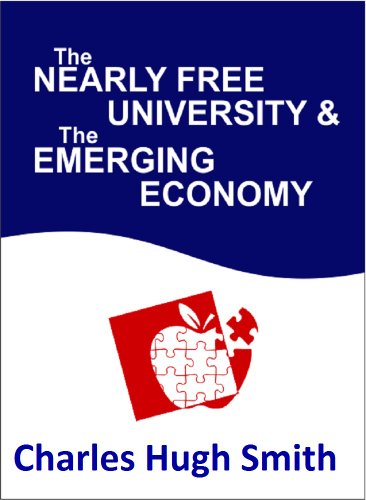It boils down to two very simple principles: accredit the student, not the institution and teach every student how to rigorously learn on their own.
Vested interests have every incentive to maintain the status quo: specifically, those who currently own the assets, income streams and power will continue to own the assets, income streams and power.
To accomplish this, vested interests must suppress, undermine or co-opt structural innovation, which threatens to obsolete the status quo. Innovation is bandied about rather freely now, generally as a marketing pitch, but real honest-to-goodness innovation is absolutely toxic to entrenched elites and vested interests, both of whom lose out when their gravy train is thrown off the tracks by innovation.
Cartels and monopolies are especially vulnerable to structural innovation, as the high costs they impose on customers and society eventually threaten to bankrupt households and even the state itself. To save itself from insolvency, the political-economic power structure must either accept innovation or it will be swept away by innovation.
Political power is nice but it’s not enough. In the late 19th century, England’s landed nobility and gentry had long held political power, and they attempted to use this power to bring the rising industrialists to heel.
Alas, the economic forces unleashed by industrialization could not be contained by mere political power, and the landed elites were superseded by the industrialist elites: It’s a pity you had to sell your estate to the National Trust, but at least you have your memories of grandeur.
 The Nearly Free Univer...
Buy New $6.95
(as of 04:00 UTC - Details)
The Nearly Free Univer...
Buy New $6.95
(as of 04:00 UTC - Details)
Which brings us to the equivalent vested interests of America’s cartels: higher education, defense contractors and “healthcare” which profits not from health but from sickness.
Each cartel is ripe for disruption via technological innovation, and each is devoting enormous energy to protecting its fiefdom.
Case in point: I was recently asked to speak about the ideas for reducing the cost of college by 90% laid out in my 2013 book The Nearly Free University and the Emerging Economy. The webinar audience was polite but skeptical: wasn’t I concerned that if campuses were obsoleted then students might not gain exposure to people different from themselves?
I think it’s self-evident that America is so diverse that just about any job will bring young people in contact with people who are different from themselves. (There’s even a large well-funded government institution that basically guarantees diversity: it’s called the U.S. military.)
Nobody asked me about the crushing burden of student loan debt, though I mentioned the $1.6 trillion debt early in my talk. Vested interests are remarkably disinterested in costs borne by others, and remarkably interested in policy tweaks that give the PR appearance of addressing unaffordable costs of the cartel that pays their salary.
For example: free college for all, Medicare for All, etc.: how do you gain the political approval of vested interests? Guarantee the federal government (i.e. taxpayers) will pay all the bloated costs of a rapacious, ineffective system ruled by vested interests and predatory elites.
Transformation is painful. There’s no easy, painless way to obsolete entire sectors.




